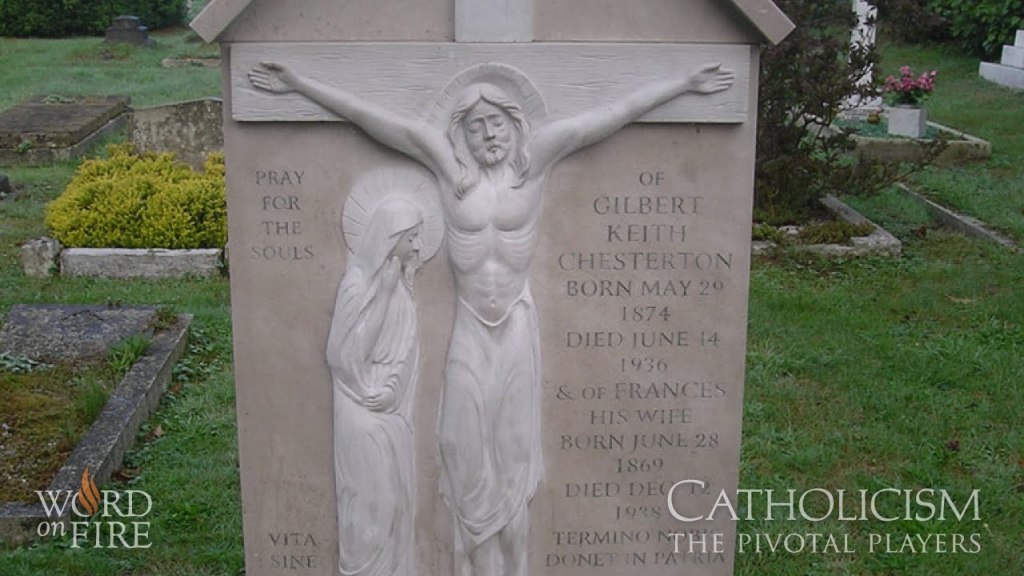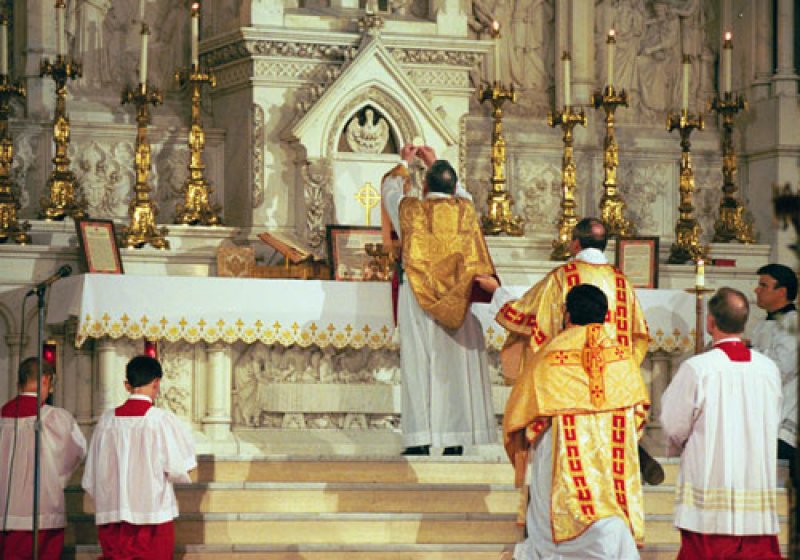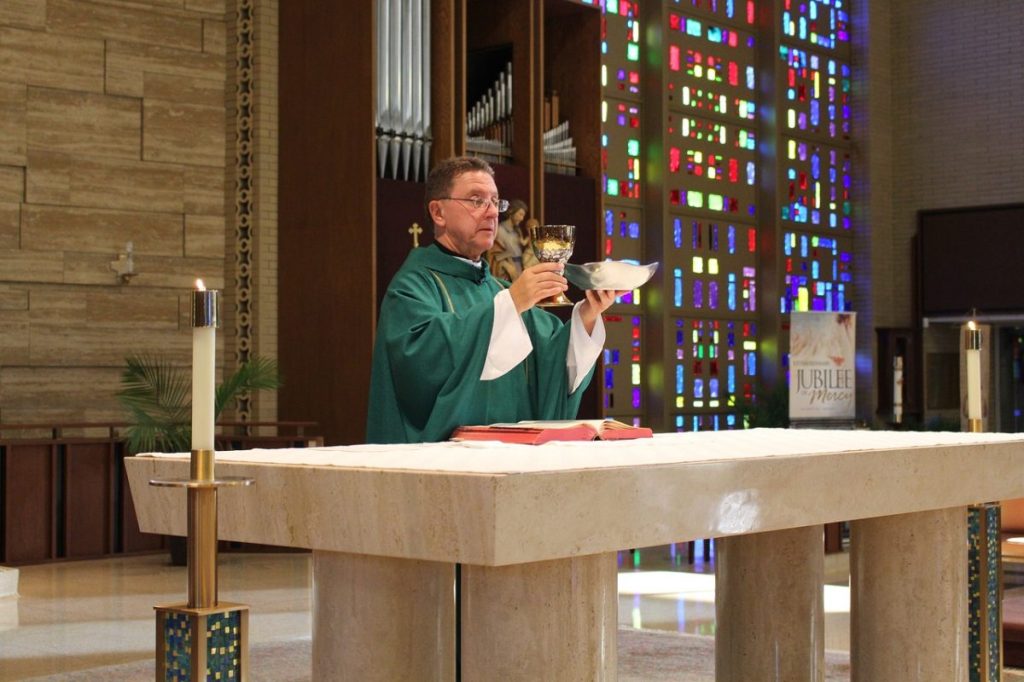
“The main point of Christianity was this: that Nature is not our mother: Nature is our sister. We can be proud of her beauty, since we have the same father; but she has no authority over us; we have to admire, but not to imitate. This gives to the typically Christian pleasure in this earth a strange touch of lightness that is almost frivolity. Nature was a solemn mother to the worshipers of Isis and Cybele. Nature was a solemn mother to Wordsworth or to Emerson. But Nature is not solemn to Francis of Assisi or to George Herbert. To St. Francis, Nature is a sister, and even a younger sister: a little, dancing sister, to be laughed at as well as loved.”
A quote from GK Chesterton’s famous book “Orthodoxy”. Today, on July 16th, Pope Francis abrogated “Summorum Pontificum”, a document which gave a permanent voice to conservatives in the Catholic Church through the practice of the 1962 Missal, the Pre-Vatican II Mass. Since it’s promulgation, those who maintained orthodox values but felt lost in an increasingly Liberal, morally relativistic, animalistic, and hedonic culture in the West found refuge in a fixed section of the Roman Catholic Church. A Mass which, in its own texts and rites, had no problem separating the Divine from the animalistic. A Mass which separated the Priest, “In Persona Christi”, from the laity; a Mass which separated the “Voca Ecclesiae” – Latin – from the vulgar sounds of creation, humans. A Mass whose art and architecture was premised on the vision for the Heavens, a place of insurmountable angelic beauty in eternity far above and removed from the Earth. A Mass which did not view the Eucharist as a mere community meal, but saw it as God Himself – being so incomprehensible to us mere mortals that He appeared to be but a white wafer and wine. Finally, such heavenly music that even that was without time, as if it was reverberating throughout eternity.

The message was clear – God Himself, whom we strived for, was beyond human capacity in the here and now. We lived a limited existence as fleshy material creatures flawed in sinful impulses, destined for death; yet in that Mass, in that moment, our Image of God came to fruition; not only could we see God reflected in ourselves, but we could take part of Heaven through Christ’s Eternal Passion and Resurrection.
And like the last flicker of a candle, with a snap of a hand, all of it is gone.
To me, this event demonstrates with certainty the cultural death of orthodox values in the West.
I’m an individual who is keenly interested in many different religious traditions, but here in the West, it has become increasingly clear that for those who reflect the traditional, “orthodox” teachings of those religions, that they are not welcome. They are pushed out by their peers and relegated to smaller, separate, obscure, “traditional organizations”. The Episcopalians / Anglicans. The Lutherans. The Methodists. The Buddhists. The Jews. Even Satanists. The only single religion where this has not yet occurred, to my knowledge, is the Eastern Orthodox Church – yet not only is this organization obscure in its numbers in the West, but this process is just beginning.
To me, this method of “pushing out” to smaller organizations signifies the older values of these religious organizations as left in the dustbins of history. This happened with the Mormons when the Church of Latter Day Saints outlawed polygamy in the 19th century. This happened with the Russian Orthodox with the liturgical reform of Peter the Great in the 18th century. This happened even with the Roman Catholic Church with the Vatican I Reforms and the Old Catholic schism. The beliefs / values / rituals of these organizations changed to reflect a new generation, with the old folks persisting in small obscure numbers but stagnating, left as relics of historical conflict. Of course, the most notable example of obstinate traditionalism are the Amish.
For many years, I noticed this trend with orthodox values and was in denial. I chucked it up to Liberal Protestants in urban, Liberal areas, along with the non-Christian religions as an end result of a Liberal hijacking of ethnic religions. And for me, this was the truth due to the Roman Catholic Church, which remained a bulwark of orthodox values with the growth of Latin Mass attendance and the normalization of Diocesan Latin Masses. I thought we saw a younger generation embracing orthodox values in contrast to the Liberal mainstream.
But the illusions have finally shown themselves for what they are, not only with this event, but other statistics and data that have come to my attention. The Roman Catholics no longer have a bulwark of orthodoxy in their institution, and those who want to practice the orthodox values of their religion will likely leave and join a smaller organization (i.e., the SSPX or Sedevacantist groups).
The orthodox lost the mainstream, for now, perhaps indefinitely when it comes to social and individual morality.
What do I mean by “orthodox values”? I, of course, refer to “decadent” values. By “decadent”, I do not mean one that leads to societal decay – the Nietzschean sense of “decadent.” One which seeks a suppression of our animalistic impulses for something “higher”, that “higher” thing being a preparation for death, and whatever supposedly comes with it – Judgment, Karmic Reincarnation, etc. One which made man a “crafty animal”, who saw a contradiction between the rational intellect and our animalistic impulses. We didn’t just let our instincts flow freely and enjoy the pleasures of life – sex, food, wealth, material gain, and the satisfaction that comes from dominance – no rather, values which disavowed these things as hindrances towards something higher – God, Moksha, Nirvanna, etc. – and of course, “love” towards our brothers and sisters in humanity. These values which denied the human being as a chimp animal who craved dominance and power over others, and the pleasure of base, lower, and impulsive instincts that fulfill our natural appetites. Nietzsche sought Western civilization as a constant struggle between “decadent” and “life-affirming” values; the “life-affirming” values being the antithesis to “decadent” values – values which saw wealth, dominance, power, sex, and pleasure as divine; for those who affirmed “life”, nothing was more evil than weakness or impotence. The periods of time of life-affirmation include Ancient Pagan Rome, who worshipped deified personifications of drunkenness and lovemaking, beauty and lust, power and masculinity, war and plundering, etc., and subsequently the Renaissance which saw a rebirth of these values. The periods of time of decadence include the following Middle Ages after the collapse of Rome, and then the Protestant Reformation as a response to the Pagan values of the Renaissance – Judea against Rome, Rome against Judea.
There are many individuals, particularly on the Alt-Right, who believe that the Liberalism of today is, in fact, decadent, and a glorious age of a dominance and life-affirming values will be on our way. But this is overtly simplistic.
In my opinion, we are living in that “glorious” age where individual morality / social morality is very much life-affirming. I think that, practically speaking, we are politically not life-affirming, but rather, politically decadent (one only needs to look for our social self-aggrandizement for Western history and self-aggrandizement in Western international relations), but socially and individually we are life-affirming, with only lip service towards egalitarianism in the same way the Renaissance paid lip service to Christianity.
Even so, unlike orthodox values, the underlying morality of our “egalitarian society” today is fundamentally rooted in the notion of hierarchical dominance and power as an intrinsic good (hence why we need women and minority groups to be in positions of power). Lust and romance is embraced as an intrinsic good. Even the promiscuity of homosexuality, just like that of Pagan Rome, is seen as a moral good. Chastity is mocked as an insult. We live in an era that worships the financially successful and laughs at failures. And more than ever, human beings are as shallow as ever to external attractiveness (women on OKCupid find 85% of men below average in attractiveness), and laughing at “losers” who are “beautiful on the inside.”
And the youthful generation has fully embraced these values. 1 in 6 Zoomers now identify as LGBT. 52% of Zoomers intend to use Tinder; in fact, Online Dating is now the most popular way young couples meet. Hookup culture is the norm on college campuses. 42% of people would not date a virgin. 72% of people use Social Media, a platform, of course, that exists by and large to show off how much material wealth an individual has.
The virtue signaling, corporate “ressentiment” of “oppressed identity groups” is nothing more than handwaving in the same way the Renaissance was to Christianity – nothing will ever truly be implemented in a way that will challenge the people truly in charge. We live in a Renaissance world; in the same way the Renaissance had no qualms painting the Saints in homoerotic ways, and now, European art in Churches do the same.
Is there merit, or value, with decadence values? Aside from the fact that such decadence is necessary for social cooperation and inscribed into our social being to some level, the decadence values I would argue gave human beings the reality that they were something greater than animals, being able to find value in things that weren’t impulsive , and providing meaning in their lives as such; it allowed people to view life as something more than an arbitrary social dominance hierarchy, allowing human beings a more refined taste in art and life, and to add an intrinsic value to every human being regardless of their abilities to secure resources. It also gave human beings sophistication, allowing the mind to rise above the flesh, and inspect life as such, giving the human mind power over nature. As such, it would cement a greater amount of social co-operation and genuine selfless compassion towards other human beings.
To me, the theological implications of the Buddhist heavens demonstrate this (in terms of romantic relations). As you go up, beings are increasingly detached from sensuality. As explained by Ajahn Punnadhamo, as the heavens go up, the pleasure experienced is more refined and subtle, more sophisticated. In the lowest heaven, Tallitisa Heaven, the devas engage in sexual intercourse with each other in relationships with each other; however, in the next level up, the Yama Heaven, the beings merely fondle and caress each other; in the Sita Heaven, they merely hold each others’ hands and gaze each others’ eyes; in the Fifth Heaven, they merely gaze into each others’ eyes and smile, and in the Sixth Heaven, they just gaze into each others’ eyes without smiling. As you go up in each Heaven, the pleasure is greater and more beautiful. Indeed, this sophistication is higher and more refined than just acting on impulses.
Although Buddhism is a decadent religion, the implications here are an enjoyment of pleasure from the other person in their existence alone, out of love, and the value of the life of others rather than just the self alone. And this refined love seems to be validated with studies. An analogous kind of sophisticated beauty, seeing parents hugging their children in Church.
However, we are at the losing battle of the supranatural (rising above the natural) vs. the natural. Per my Chesterton quote, orthodox values seek to make nature equal to or subordinate to humanity, rather than humans subordinate to nature. The life-affirmer affirms the natural, the decadent, supranatural.
The Roman Catholic abolition of the Latin Mass marks a return to the natural – the priest is equal to the person; there is no incense or heavenly art any more, nor even really any candles signifying the Divine Fire of Proto-European religion. The priest is no longer separated in posture from the people as a minister of the Divine – he is the minister of the people. He speaks the language of the people and doesn’t chant, but cordially speaks the Mass. The laity read the words of God. And the Eucharist is a community meal that is more a “sign” than a “sacrament”.

One will find supreme irony in my claims, in the fact that the Mass is made more natural than supranatural, when Christianity in of itself is a decadence religion. However, I feel that Christian religions, and all decadence religions, are being continuously warped to fit our Western cultural narrative of life-affirmation and faux social egalitarianism, and this symbolic deconstruction of the supranatural, for good, is only the beginning of a further warping to take place. Indeed, Christianity will continue to subject itself to our contemporary Western social norms, even if such religions remain merely as cultural markers in our society, becoming obsolete entirely.
Discussion of the merits of each moral system in political, social, and individual contexts will come in the future of this blog. But for now, unless society changes (unlikely in the short term), or even society collapses and the cycle begins anew, we’ll have to venerate orthodoxy in its grave as we exist on the outskirts of town for survival in our small religious organizations, us poor banished children of Eve.